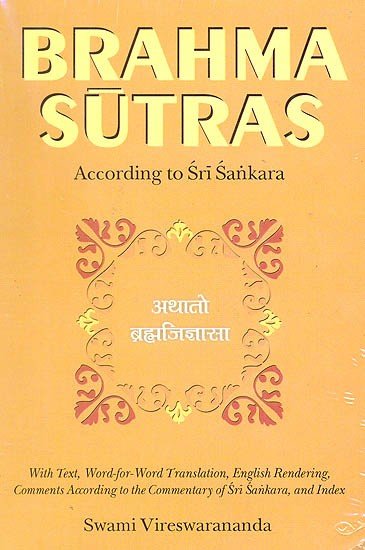Brahma Sutras (Shankara Bhashya)
by Swami Vireshwarananda | 1936 | 124,571 words | ISBN-10: 8175050063
This is the English translation of the Brahma-sutras including the commentary (Bhashya) of Shankara. The Brahma-sutra (or, Vedanta-sutra) is one of the three canonical texts of the Vedanta school of Hindu philosophy and represents an early exposition the Vedantic interpretation of the Upanishads. This edition has the original Sanskrit text, the r...
Chapter IV, Section II, Adhikarana II
Adhikarana summary: The function of mind gets merged in Prana
Sutra 4,2.3
तन्मनः प्राणे, उत्तरात् ॥ ३ ॥
tanmanaḥ prāṇe, uttarāt || 3 ||
tat—That; manaḥ—mind; prāṇe—in Prana; uttarāt—from the subsequent clause ( of the Sruti).
3. That mind (is merged) in Prana, (as is seen) from the subsequent clause (of the Sruti cited).
That mind, in which the functions of the different organs get merged, in its turn gets merged in Prana, for the Sruti cited in Sutra 1 says, “Mind in Prana.” The opponent holds that here, unlike the case of the organs, it is mind itself, and not its function, that gets merged in Prana, inasmuch as Prana ean be said to be the material cause of mind. In support of his contention he cites the following texts: “Mind consists of food, Prana of water” (Chh. 6. 6. 5) and “Water sent forth earth” (Chh. 6. 2. 4). When mind is merged in Prana, it is the same thing cas earth being merged in water, for mind is food or earth, and Prana is water. Hence the Sruti here speaks not of the function of mind, but of mind itself getting merged in Prana. The Sutra refutes this view and says that this relation of causality by an indirect process does not justify our understanding that mind itself is merged in Prana. So here also it is the function alone that gets merged, and this is justified on the same grounds as given in Sutra 1, viz. scriptural statement and experience. We find that mind ceases to function in a dying man, even while his vital force is functioning.
